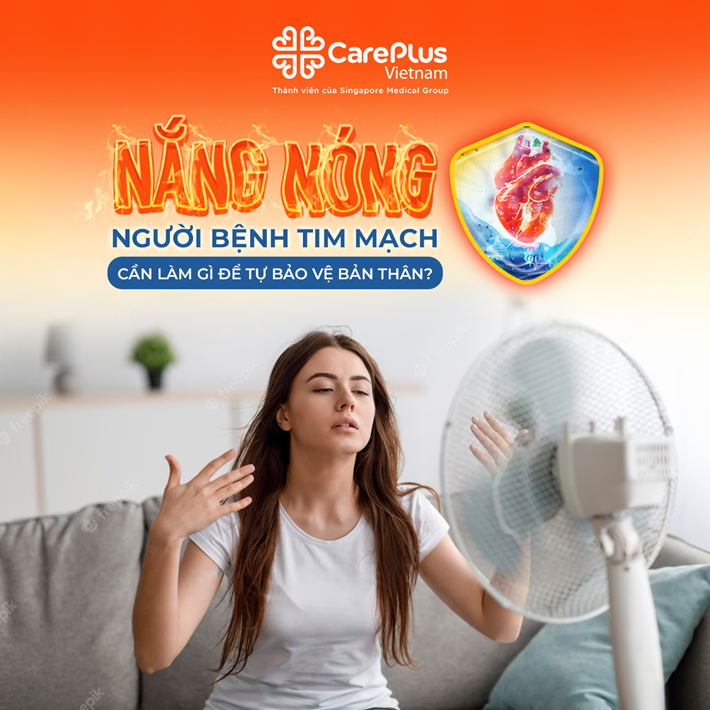HOT WEATHER: HOW CAN PEOPLE WITH CARDIAC CONDITIONS PROTECT THEMSELVES?
🫥 Climate and unpredictable weather conditions, including scorching heat and sudden rainfall, require special attention for individuals with heart disease or related cardiovascular issues. The current complex weather patterns can be challenging, as there are times when the temperature becomes extremely hot, making it difficult for our bodies to adapt and potentially leading to health issues, particularly affecting the cardiovascular system.

6/8/2023 4:56:49 PM
Let CarePlus guide you through ways to safeguard your health during periods of high temperatures and harsh climates.
🥵 HOW DOES HOT WEATHER AFFECT THE HEART?
🌤 Our bodies work harder to maintain normal body temperature during intense hot weather conditions. This puts additional stress on organs such as the heart, lungs, and kidneys. If you have pre-existing cardiovascular conditions, you are at higher risk. Therefore, it is crucial to keep your body cool and adequately hydrated. Drinking plenty of water helps compensate for excessive sweating and prevents low blood pressure.
🥶 WHAT CAN BE DONE TO KEEP THE BODY COOL?
💥 Here are some simple practices you can follow:
Keep your body well-hydrated by drinking plenty of water or other beverages. Water is the best choice, but milk, fruit juices, tea, and coffee are also acceptable (though it's best to limit caffeine intake to no more than three cups of tea or coffee per day, or switch to decaffeinated versions). If you have been diagnosed with heart failure, consult your doctor about fluid intake restrictions.
Important considerations for patients with cardiac conditions coping with hot weather:
- Avoid consuming excessive amounts of alcoholic beverages as they can lead to increased dehydration due to their diuretic effects.
- Include cooling foods in your diet, such as vegetables, salads, and fruits, as they provide high water content and valuable vitamins and minerals.
- Maintain a well-ventilated and cool living environment. Shield direct sunlight from entering through windows using curtains or blinds. Alternatively, open windows if the outside temperature is cooler than indoors. Turn off any unnecessary lights or electronic devices that generate heat, as they can unintentionally raise the temperature in your home.
- Choose the coolest area in your home for resting, particularly when sleeping.
- Wear lightweight and loose-fitting clothing.
- Avoid going outdoors during the hottest hours of the day (from 11 am to 3 pm).
- If you need to go outside, prioritize staying in shaded areas. Remember to apply sunscreen, wear a hat, and carry a water bottle for continuous hydration.
- Avoid excessive physical exertion.
💥 WHAT SHOULD I DO IF I FEEL UNWELL DURING HOT WEATHER?
Here are four quick ways to improve your condition within approximately 30 minutes:
- Move to a cool place immediately.
- Lie down, relax your body, and elevate your legs slightly higher than your head.
- Drink plenty of water.
- Cool your skin by wiping it with cool water and use a fan to provide immediate body cooling.
💥 HEART FAILURE
🫵 If your doctor has advised you to limit fluid intake, discuss with a specialist how to keep your body cool during the summer. If you are taking diuretics and experiencing dizziness or lightheadedness, inform your doctor for potential medication adjustments.
💥 HEAT STROKE
- Excessive loss of body fluids can increase your body temperature and can be life-threatening if not treated promptly.
- Symptoms of heat stroke include profuse sweating, cold and clammy skin, dizziness, fainting, muscle cramps, heat rash, swelling in the ankles or feet, rapid shallow breathing, nausea, and vomiting.
- If you suspect that you or someone else is experiencing heat stroke, call emergency services at 115.
💥 WHO IS AT HIGHEST RISK?
- Elderly individuals and young children have more difficulty regulating their body temperature and therefore may be at higher risk from extreme temperatures.
- Older adults, especially those over 75 years old, living alone, or in nursing homes.
- Individuals with chronic diseases, including cardiovascular disease, lung disease, kidney disease, diabetes, and Parkinson's disease.
- Individuals who are unable to actively avoid exposure to hot weather, such as bedridden individuals, disabled individuals, individuals with cognitive decline, or those who work outdoors.
🎯 Most people are unaware of their susceptibility to health risks in hot weather. With the current hot and sunny weather, it is important to regularly check on the health of your friends and family to ensure they are comfortable and safe.